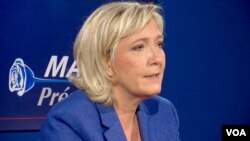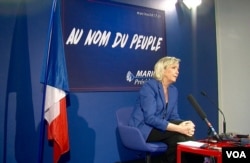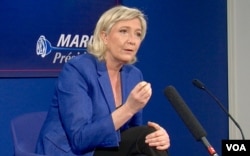Polling strongly ahead of France's presidential elections, far-right leader Marine Le Pen on Friday sketched out foreign policy priorities she'll pursue if she wins the vote, which include backing an alliance with Washington and Moscow to fight Islamist extremism, carving out a new relationship with the European Union and deepening ties with francophone Africa.
In a wide-ranging interview with English-speaking reporters in Paris, Le Pen also defended the populism now surging across Europe and the United States, which has toppled mainstream politicians and is closely associated with her National Front party.
"Is it those who want to defend the government of, for and on behalf of the people?" she asked. "If that's the case, then I accept being called a populist."
She also dipped into domestic politics, lambasting French banks for refusing loans to finance her campaign as "scandalous," and calling for drastic cuts in the number of French Senate and National Assembly seats as part of a broader plan to shrink layers of French governance.
France's presidential campaign is among Europe's most closely watched this year, and Le Pen is riding a wave of voter anger about the lackluster economy, rising immigration and militant Islam. So unpopular is incumbent President Francois Hollande that he announced last month he would not run for re-election in April. His ruling Socialists hold primaries this month, but the winner stands little chance of prevailing in the general vote.
Runoff, loss seen
Many polls and pundits predict Le Pen may end up in a runoff vote in May but lose the presidency — an outcome reminiscent of 2002, when her father, Jean-Marie Le Pen, lost to incumbent Jacques Chirac in what amounted to a massive vote against extremism.
Today, however, the younger Le Pen is far more popular than her father. She has softened the edges of her far-right party, making it more palatable to mainstream voters.
A new Elabe survey out Thursday found Le Pen slipping in the polls against center-right candidate Francois Fillon, currently seen as the likeliest next president. Still, she exuded confidence and elegance as she met with reporters and pointed to the unreliability of opinion polls, as shown recently in the U.S. elections.
Le Pen was one of the first foreign politicians to congratulate Donald Trump on his shock victory in the U.S. in November, even before the final results were announced. Just days before he assumes office, she hailed potentially warming relations between Washington and Moscow under a Trump presidency.
"If Mr. Trump and Mr. Putin can find the path for pacifying relations," she said, "geographically, politically and strategically, as a French citizen, I rejoice in this."
She also sketched out a possible alliance between Washington, Paris and Moscow aimed at battling Islamist extremism in Syria and elsewhere.
"There are no moderate rebels, there are Islamist fundamentalists ... and the powers must eradicate them," Le Pen said, asserting that French foreign policy helped create the crises in Syria and Libya.
Defense of Russia
Similarly, she blamed the European Union for tense relations with Moscow and, not for the first time, defended Russia's right to annex Crimea. Like Trump, she also expressed doubt that Russia had meddled in the U.S. elections.
"I'm not sure there are really serious elements behind the accusations of cyberattacks," Le Pen said, blaming U.S. Democrats for their loss. "They had to find an excuse, so they found it with the Russians."
Le Pen also backed greater French investment in francophone Africa's development "as one way to avoid gigantic migration flows" in the coming decades.
On the EU, Le Pen said she would first try to renegotiate a new deal that would see France regaining control over its currency, borders, and economic and political sovereignty as a possible alternative to holding a "frexit" vote six months after entering office. If the EU accedes to her demands, Le Pen said, she will counsel French voters to remain in the bloc.
"I think many countries will profit from these negotiations to assert their own preoccupations," she added, predicting the resulting pressure could lead to a "Europe that respects people's sovereignty."






